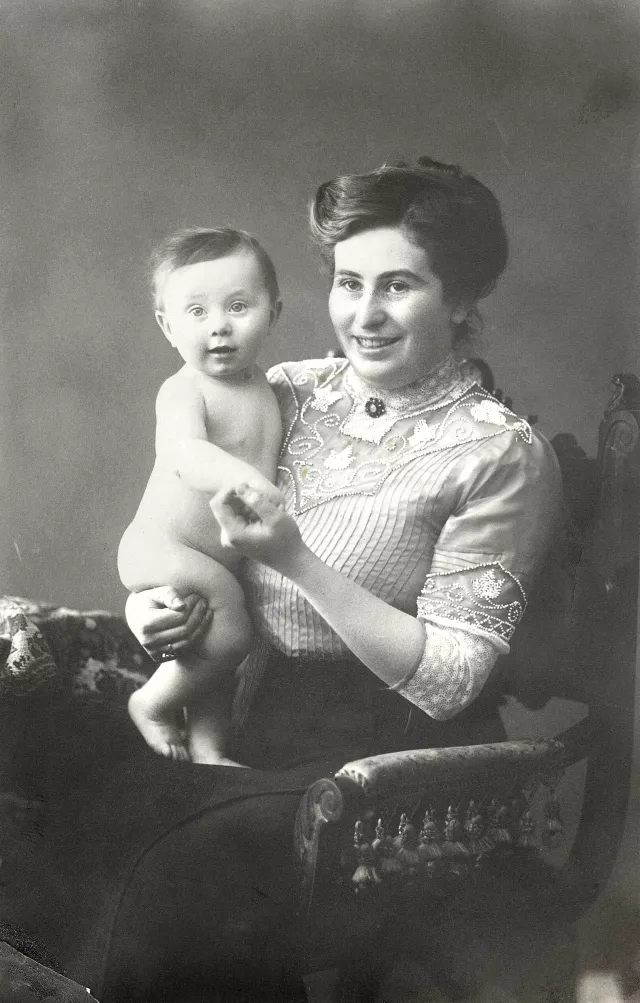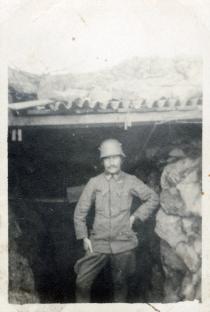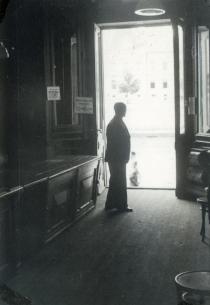Margit and Laci Deutsch
This picture was taken in 1911. The baby is Laci Deutsch, my brother-in-law, and he is held by his mother Margit Deutsch. Laci was born in 1910 in Szaszregen, and I think the picture was taken there.
On the back of the photo it says 'To Ilon and Henrik', that means the picture was sent to Ilona and Henrik Mestitz, the furniture manufacturer in Marosvasarhely. Ilona Mestitz and Gyula's mother were sisters. I got the picture from the Mestitzs.
My mother-in-law was born in 1889. The Deutsch family lived both in Szaszregen and in Marosvasarhely. They were wealthy; they owned a textile store in Szaszregen, which was founded by Gyula's grandparents at the end of the 1880s. They also had a store in Marosvasarhely. I don't know exactly in which year before World War II they moved back to Szaszregen
I don't know much about my mother-in-law, only that she was a fine, tall and well-built woman. Gyula used to say how beautifully long his mother's hair was, and she never cut it, it was always like that. It cannot be seen here because it is gathered into a knot, but if she combed it out, it reached under her waist.
Before she got married, she attended a Catholic convent in Temesvar. That was a higher elementary school with four grades, corresponding to the current fifth to eighth grades, but they got such a serious education and knowledge it was like a high school today. She spoke very nice German and French. Back then it was important to learn needlework and to keep the house. She also learnt music, but mostly theory. She knew how to play the piano, but only at the extent she had been taught there, not at a high level. Gyula always praised her beautiful handwriting. She had hay-asthma. In the spring and in the summer, during the harvest, she used to get sick.
Gyula told me his grandmother lived with them in Regen. I don't know any more exactly, whether she was his paternal or maternal grandmother. There was a Romanian family there - customers of the store, I believe that's how they knew each other -, and they lived in a very remote place in a nearby village. They wanted to hide Gyula's parents from deportation, but they didn't want to accept the grandmother. The parents couldn't accept that because they didn't want to leave the grandmother by herself, and unfortunately they remained in Regen. They were all deported: father, mother and grandmother, and all ended up in the gas chamber. If they had accepted the offer then, they would have probably escaped, because it was such a remote place, that there was no sign of the war; no Germans, Russians or anybody else went there.
Gyula and his older brother Laci were taken to forced labor together, in 1942. They first went to Maramarossziget, then to Hungary. They also worked in Nagybanya, Szentkiralyszabadja [in Hungary], in Poland and Subcarpathia. They were together all the time, and they were liberated together. I think they came home already at the end of 1944, and luckily they pulled through the rest of it.
I got acquainted with Gyula after World War II, and since his parents never came home from Auschwitz, I never met them.






























